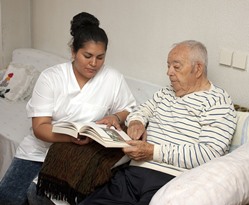How to Enroll In the Right LPN Program near Delta Colorado
 There are basically two scholastic credentials available that provide education to become an LPN near Delta CO. The one that may be completed in the shortest period of time, usually about 12 months, is the certificate or diploma program. The other choice is to earn a Practical Nursing Associate Degree. These LPN programs are more comprehensive in nature than the diploma option and normally require 2 years to complete. The advantage of Associate Degrees, aside from providing a higher credential and more comprehensive instruction, are that they provide more transferable credit toward a Bachelor’s Degree in nursing. No matter the type of credential you pursue, it should be state approved and accredited by the National League for Nursing Accrediting Commission (NLNAC) or another national accrediting organization. The NLNAC warrants that the syllabus effectively prepares students to become Practical Nurses, and that the majority of graduates pass the 50 state required NCLEX-PN licensing exam.
There are basically two scholastic credentials available that provide education to become an LPN near Delta CO. The one that may be completed in the shortest period of time, usually about 12 months, is the certificate or diploma program. The other choice is to earn a Practical Nursing Associate Degree. These LPN programs are more comprehensive in nature than the diploma option and normally require 2 years to complete. The advantage of Associate Degrees, aside from providing a higher credential and more comprehensive instruction, are that they provide more transferable credit toward a Bachelor’s Degree in nursing. No matter the type of credential you pursue, it should be state approved and accredited by the National League for Nursing Accrediting Commission (NLNAC) or another national accrediting organization. The NLNAC warrants that the syllabus effectively prepares students to become Practical Nurses, and that the majority of graduates pass the 50 state required NCLEX-PN licensing exam.
What is an LPN?
 Licensed Practical Nurses have numerous tasks that they perform in the Delta CO health facilities where they practice. As their titles imply, they are mandated to be licensed in all states, including Colorado. Even though they may be accountable for managing Certified Nursing Assistants (CNA), they themselves typically work under the oversight of either an RN or a doctor. The medical care facilities where they work are numerous and varied, such as hospitals, medical clinics, schools, and long-term care facilities. Anywhere that you can encounter patients in need of medical assistance is their domain. Each state not only regulates their licensing, but also what work activities an LPN can and can’t perform. So based on the state, their everyday work activities may include:
Licensed Practical Nurses have numerous tasks that they perform in the Delta CO health facilities where they practice. As their titles imply, they are mandated to be licensed in all states, including Colorado. Even though they may be accountable for managing Certified Nursing Assistants (CNA), they themselves typically work under the oversight of either an RN or a doctor. The medical care facilities where they work are numerous and varied, such as hospitals, medical clinics, schools, and long-term care facilities. Anywhere that you can encounter patients in need of medical assistance is their domain. Each state not only regulates their licensing, but also what work activities an LPN can and can’t perform. So based on the state, their everyday work activities may include:
- Checking vital signs
- Administering medicines
- Starting IV drips
- Monitoring patients
- Taking blood or urine samples
- Managing patient records
- Supporting doctors or RNs with procedures
In addition to their occupational responsibilities being regulated by each state, the health care facilities or other Delta CO healthcare providers where LPNs work can further limit their job roles within those parameters. Also, they can practice in various specialties of nursing, for instance long-term care, critical care, oncology and cardiology.
LPN Programs Online
 Enrolling in LPN schools online is emerging as a more in demand way to receive instruction and acquire a nursing certificate or degree in Delta CO. Some schools will require attendance on campus for a component of the training, and almost all programs require a certain number of clinical rotation hours completed in a local healthcare facility. But since the remainder of the training may be accessed online, this alternative may be a more accommodating solution to finding the free time to attend college for some students. Pertaining to tuition, some online degree programs are less costly than other on campus alternatives. Even supplementary expenses such as for commuting and study materials may be lessened, helping to make education more easily affordable. And numerous online programs are accredited by U.S. Department of Education recognized organizations. Therefore if your work and family obligations have left you with limited time to work toward your academic goals, it could be that an online LPN training program will make it easier to fit a degree into your active schedule.
Enrolling in LPN schools online is emerging as a more in demand way to receive instruction and acquire a nursing certificate or degree in Delta CO. Some schools will require attendance on campus for a component of the training, and almost all programs require a certain number of clinical rotation hours completed in a local healthcare facility. But since the remainder of the training may be accessed online, this alternative may be a more accommodating solution to finding the free time to attend college for some students. Pertaining to tuition, some online degree programs are less costly than other on campus alternatives. Even supplementary expenses such as for commuting and study materials may be lessened, helping to make education more easily affordable. And numerous online programs are accredited by U.S. Department of Education recognized organizations. Therefore if your work and family obligations have left you with limited time to work toward your academic goals, it could be that an online LPN training program will make it easier to fit a degree into your active schedule.
LPN Salary
According to the Bureau of Labor Statistics, the median annual wage for Licensed Practical Nurses (LPN) was $45,030 in May 2017. The median wage is the wage at which half the workers in an occupation earned more than that amount and half earned less. The lowest 10 percent earned less than $32,970, and the highest 10 percent earned more than $61,030. Most licensed practical nurses near Delta CO work full time, although about 1 in 5 worked part time in 2016. Many work nights, weekends, and holidays, because medical care takes place at all hours. They may be required to work shifts of longer than 8 hours. Employment of LPNs is projected to grow 12 percent from 2016 to 2026. Job prospects should be favorable for LPNs who are willing to work in rural and medically under served areas.
Questions to Ask LPN Schools
 Once you have decided on obtaining your LPN certificate, as well as if you will attend classes on campus or on the internet, you can utilize the following pointers to begin narrowing down your options. As you probably are aware, there are many nursing schools and colleges near Delta CO as well as within Colorado and throughout the United States. So it is important to decrease the number of schools to choose from to ensure that you will have a workable list. As we previously pointed out, the site of the school as well as the expense of tuition are probably going to be the first two points that you will take into consideration. But as we also stressed, they should not be your sole qualifiers. So prior to making your ultimate selection, use the following questions to evaluate how your selection compares to the field.
Once you have decided on obtaining your LPN certificate, as well as if you will attend classes on campus or on the internet, you can utilize the following pointers to begin narrowing down your options. As you probably are aware, there are many nursing schools and colleges near Delta CO as well as within Colorado and throughout the United States. So it is important to decrease the number of schools to choose from to ensure that you will have a workable list. As we previously pointed out, the site of the school as well as the expense of tuition are probably going to be the first two points that you will take into consideration. But as we also stressed, they should not be your sole qualifiers. So prior to making your ultimate selection, use the following questions to evaluate how your selection compares to the field.
- Accreditation. It’s a good idea to make sure that the certificate program along with the school are accredited by a U.S. Department of Education acknowledged accrediting agency. Besides helping ensure that you obtain a quality education, it may assist in securing financial aid or student loans, which are frequently not provided for non-accredited schools near Delta CO.
- Licensing Preparation. Licensing prerequisites for LPNs are different from state to state. In all states, a passing score is required on the National Council Licensure Examination (NCLEX-PN) as well as graduation from an accredited school. Some states require a specified number of clinical hours be completed, as well as the passing of additional tests. It’s important that the school you are enrolled in not only delivers an excellent education, but also readies you to satisfy the minimum licensing requirements for Colorado or the state where you will be working.
- Reputation. Look at online rating companies to see what the evaluations are for all of the LPN schools you are looking into. Ask the accrediting agencies for their reviews also. In addition, contact the Colorado school licensing authority to check out if there are any complaints or compliance issues. Finally, you can call some nearby Delta CO healthcare organizations you’re interested in working for after graduation and ask what their opinions are of the schools as well.
- Graduation and Job Placement Rates. Find out from the LPN programs you are looking at what their graduation rates are as well as how long on average it takes students to complete their programs. A low graduation rate may be an indication that students were displeased with the program and dropped out. It’s also essential that the schools have high job placement rates. A high rate will not only verify that the school has a favorable reputation within the Delta CO healthcare community, but that it also has the network of contacts to help students obtain a position.
- Internship Programs. The most ideal way to obtain experience as a Licensed Practical Nurse is to work in a clinical setting. Essentially all nursing degree programs require a certain number of clinical hours be completed. A number of states have minimum clinical hour prerequisites for licensing also. Find out if the schools have a working relationship with nearby Delta CO community hospitals, clinics or labs and help with the placing of students in internships.
Enrolling in an LPN Program near Delta CO?
If you are considering enrolling in and attending an LPN school near Delta CO, you may find the following information both interesting and useful when making your final decision.
Convair F-106 Delta Dart
The Convair F-106 Delta Dart was the primary all-weather interceptor aircraft of the United States Air Force from the 1960s through the 1980s. Designed as the so-called "Ultimate Interceptor", it proved to be the last dedicated interceptor in U.S. Air Force service to date. It was gradually retired during the 1980s, with the QF-106 drone conversions of the aircraft being used until 1998 under the Pacer Six Program.[3][4][5]
The F-106 was the ultimate development of the USAF's 1954 interceptor program of the early 1950s. The initial winner of this competition had been the F-102 Delta Dagger, but early versions of this aircraft had demonstrated extremely poor performance, limited to subsonic speeds and relatively low altitudes. During the testing program the F-102 underwent numerous changes to improve its performance, notably the application of the area rule to the fuselage shaping and a change of engine, and the dropping of the advanced MX-1179 fire control system and its replacement with a slightly upgraded version of the MX-1 already in use on subsonic designs. The resulting aircraft became the F-102A, and in spite of being considered barely suitable for its mission, the Air Force sent out a production contract in March 1954, with the first deliveries expected in the following year.[6][7]
By December 1951 the Air Force had already turned its attention to a further improved version, the F-102B. Initially the main planned change was the replacement of the A-model's Pratt & Whitney J57 (itself replacing the original J40) with the more powerful Bristol Olympus, produced under license as the Wright J67. By the time this would be available, the MX-1179 was expected to be available, and was selected as well. The result would be the "ultimate interceptor" the Air Force wanted originally. However, while initial work on the Olympus appeared to go well, by August 1953 Wright was already a full year behind schedule in development. Continued development did not resolve problems with the engine, and in early 1955 the Air Force approved the switch to the Pratt & Whitney J75.[8][N 1]
Choose the Right LPN Program near Delta CO
 Picking the ideal Licensed Practical Nurse school is probably the most critical first step to beginning a new career in the medical care industry. There are a number of factors that you must consider when selecting a nursing school. These factors will be prioritized differently depending on your current career goals, lifestyle, and economic status. As we have pointed out in this article, it is essential that you enroll in an LPN school and a certificate or degree program that are both accredited and have outstanding reputations within the medical community. You originally decided to visit this website because of an interest in Accredited LPN Schools. However, by using our checklist of qualifying questions, you will be able to produce a short list of schools to select from so that you can make your ultimate selection. And with the right degree and training, combined with your dedication and desire to succeed, you can become an LPN in Delta CO.
Picking the ideal Licensed Practical Nurse school is probably the most critical first step to beginning a new career in the medical care industry. There are a number of factors that you must consider when selecting a nursing school. These factors will be prioritized differently depending on your current career goals, lifestyle, and economic status. As we have pointed out in this article, it is essential that you enroll in an LPN school and a certificate or degree program that are both accredited and have outstanding reputations within the medical community. You originally decided to visit this website because of an interest in Accredited LPN Schools. However, by using our checklist of qualifying questions, you will be able to produce a short list of schools to select from so that you can make your ultimate selection. And with the right degree and training, combined with your dedication and desire to succeed, you can become an LPN in Delta CO.
More Practical Locations in Colorado
